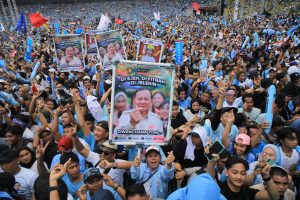As Indonesians head to the polls on Wednesday, one issue has defined the 2024 election, and that issue is the economy. Outgoing President Joko “Jokowi” Widodo is extremely popular, with most polls putting his approval rating at around 80 percent. In large part, this popularity stems from a solid record of economic governance over the last 10 years.
If the polls are to be believed (and there’s no reason they shouldn’t be) a majority of Indonesian voters are happy with the way things have been going and would like to see the next president continue doing more of the same. Jokowi’s two-time electoral foe and current minister of defense, Prabowo Subianto, is the candidate who most people believe will do that, especially after Jokowi’s son joined the ticket as vice-presidential candidate. In a nutshell, this is why polls are currently forecasting Prabowo to win. He is seen as the candidate most likely to continue Jokowi’s economic policies.
So why is this policy legacy so popular? Looking at basic macroeconomic indicators gives us some clues. Since Jokowi took office in 2014, the Indonesian economy has grown by an average of 4.2 percent every year. If we drop out the pandemic years of 2020 and 2021, that figure rises to 5.1 percent. This is a solid record of growth for an economy the size of Indonesia over ten years. Economic activity has also become more balanced over time. For instance, Indonesia is not as dependent on commodity exports as it once was, with growth being increasingly driven by a combination of consumption and investment.
The Jokowi era has also seen a big uptick in investment. According to World Bank data, net foreign direct investment averaged $15.5 billion a year from 2014 to 2022, and portfolio investment (inflows to liquid assets like stocks and bonds) averaged $12.6 billion a year. People often focus on the role of Chinese investment, but that’s a red herring. Investment has come from a variety of sources and in a variety of forms. Moreover, investment is not just about foreign capital. Domestic capital markets are deepening, especially the Indonesia Stock Exchange, which has seen its market cap grow tremendously over the last 10 years as hundreds of new companies have gone public.
The last 10 years have also seen a big boom in the construction of physical infrastructure like toll roads, airports, power plants, and dams. It has been one of the defining features of Jokowi’s presidency, and it is also something voters can see tangible evidence of. At the same time, fiscal reforms have driven tax revenue way up in recent years. People often worry about unsustainable public debt in Indonesia, but the truth is that despite increased spending the state’s fiscal health is quite good.
Of course, the Jokowi era is not without its flaws. It has been criticized for wasteful public works projects, widespread corruption, and the prioritization of economic growth over the interests of local communities and the environment. These are all valid concerns. But at the end of the day, 5 percent annual growth anchored by investment and consumption, combined with big public spending on infrastructure and social welfare (like energy subsidies) and financed by sound fiscal policies makes for a popular record of economic governance.
The winning formula in this election was always going to be convincing the public that this record would be maintained and built upon over the next five years. And on the eve of the election, Prabowo Subianto is the candidate who has done that most effectively.
































